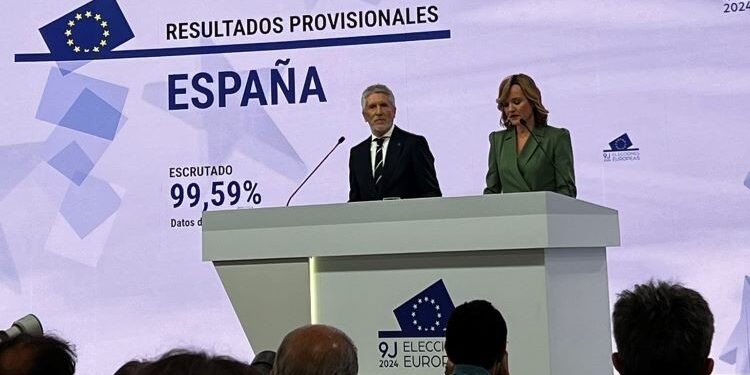The Diplomat
The PP has won the European elections in Spain, with 22 of the 61 seats, 34.18 percent of the votes and nine more seats than in the previous elections in 2019. It is followed by the PSOE, with 20 seats, four percentage points less and one seat less.
Next are Vox, with six seats, 9.62 percent and two more seats; Repúblicas 4.9%), Sumar (4.6%, three more seats) and Se Acabó la Fiesta (SALF, 4.5%), with three seats each; We can, with two seats (four less); and Junts and Coalition for a Europe of Solidarity (CEUS), with one seat each. The rest of the candidates have been left out.
The participation in these elections has been 49.20%, a drop of 11.5 points compared to 2019 (60.72%) and four points more than in 2014, according to what the Minister of the Interior announced at a press conference. , Fernando Grande-Marlaska, and the Government spokesperson, Pilar Alegría.
The elections took place in the midst of an intensification of the discourse between PSOE and PP, a week after Parliament approved the amnesty law, with a series of diplomatic problems likely to mobilize both the vote of the most radical right against the president of the Government, Pedro Sánchez, and that of the left in his favor (such as the conflict with the Argentine president Javier Milei) and after the judicial summons to Sánchez’s wife, Begoña Gómez, for alleged influence peddling.
In the EU as a whole, the European People’s Party (EPP) has won, with 191 seats, followed by the Social Democrats (S&D), with 135; the liberals of Renew Europe, with 83; the extreme right of European Conservatives and Reformists (ECR), with 71; the also far-right Identity and Democracy (ID), with 57; the Greens of Greens/EFA, with 53; unregistered (NI, which includes Junts), with 45; the leftists of The Left with 35; and Others, with 50.
After learning the results, the president of the European Commission and candidate of the European People’s Party (EPP) to repeat the position, the German Ursula von der Leyen, celebrated the victory of her political party in the European elections and assured that it will be a “ bastion against the extremes, left and right.”
In France, President Emmanuel Macron has dissolved the National Assembly and called legislative elections after his electoral defeat against the ultranationalist right of Marine Le Pen. In Germany, the far-right AfD came second, behind the CSD and ahead of Chancellor Olaf Scholz’s Social Democrats. In Belgium, the prime minister, the social democrat Alexander de Croo, has resigned after his heavy defeat by the Flemish nationalist right and the Walloon liberals.
Reactions in Spain
The head of the PSOE list for the European Parliament, Teresa Ribera, recognized “the electoral result of the PP”, but with “nuances”: “First of all, because the figures show that what the PP has done has been absorb all the Ciudadanos deputies, but the cost of their electoral strategy has been high,” because “permanent polarization has not weakened the far-right options.” “If Mr. Feijóo has insisted on presenting the elections as a plebiscite, it is very clear that he has lost the plebiscite, it has been a resounding failure,” she said. “We are two seats away from the PP” and the PSOE result “is practically identical to the one we achieved on July 23,” she continued. “That is, this permanent mud machine has led us to the same electoral result, supporting the Government of progress, the President of the Government, Pedro Sánchez,” she added.
The leader of the PP, Alberto Núñez Feijóo, declared that his party “has once again won elections in Spain.” “Today’s results are the best results in a European election for 25 years, since 1999. A quarter of a century is well worth waiting to achieve,” he added. The PP “won the municipal and regional elections, it won the general elections and now the European elections,” said the head of the party’s list, Dolors Montserrat. “It is a victory for Spain, because the Spanish want their country to have weight, we are going to defend the rule of law, our democracy, our freedom in Europe,” she added.
For his part, the head of the list for the European elections for Vox, Jorge Buxadé, highlighted that “Le Pen has made Macron have to call elections, Fratelli in Italy wins the elections, also our friends in Portugal, Chega, enter first time in the European Parliament” and accused Von der Leyen of “lack of respect and playing politics” for having announced her electoral victory before the closing of the polling stations in Italy.
Estrella Galán, head of Sumar’s list, expressed her concern about “the low participation” and the “advance of the extreme right, which has gained position mainly in Europe,” and urged “the democratic groups of the European Parliament to ensure the cordon sanitaire” and to not allow “them to enter the spaces of the European Union.”
Podemos candidate Irene Montero lamented that “the forces of the war consensus have a very worrying majority in Europe and Spain, including an unbearable growth of the extreme right.” “The political principles that founded Europe are at risk: peace, anti-fascism and the prosperity of the people,” she added.
For his part, Toni Comín, from Junts, declared in Brussels – accompanied by the former president of the Generalitat Carles Puigdemont and the former councilor Jordi Turull – that his formation has achieved good results “in a difficult context, because we have had elections in Catalonia weeks ago”. “We have to do a deep reflection to do it much better than we have done so far given the rise of the extreme right.” Comín makes, however, a positive assessment of the results.”







